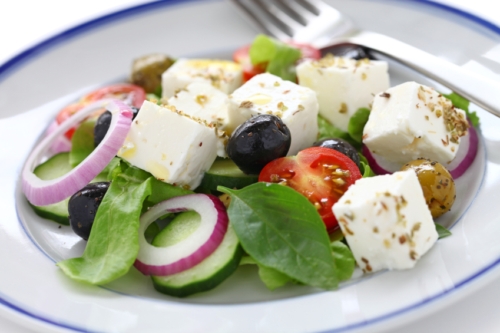
Some headlines have been generated over recently released findings from a 16-year study on how a Mediterranean diet affects hip fracture risk in older women.
Although there is fortunately less hype than has been displayed in the past, what this study might mean for the average woman requires a bit of explanation. The study’s lead author was Dr. Bernhard Haring of the University of Wurzburg in Germany.
The Mediterranean Diet – Hip Fracture Connection: In Summary
- The study covered 90,014 women in the U.S., aged 50-75, who participated in the Women’s Health Initiative study.
- Part of the Initiative had the women fill out surveys of their dietary patterns.
- The researchers took this information and compared it to the dietary patterns of the Mediterranean diet, the Healthy Eating Index 2010 (HEI-2010), the Alternative Healthy Eating Index 2010 (AHEI-2010), and the Dietary Approaches to Stop Hypertension (DASH) diet.
- The women were then followed up with 16 years later to see if they had fractures.
- The women whose habits were rated as adhering the most to the Mediterranean diet were found to have a hip fracture risk reduction of 0.29%.
- The DASH and HEI-2010 scores also showed a connection to lower hip fracture risk, but this link didn’t reach statistical significance.
- The AHEI-2010 scores didn’t show any connection to hip or total fracture risk.
- Over the 16 year period, the women suffered a total of 28,718 bone fractures, 2,121 of which were hip fractures.
It’s worth noting that the study specifies the 0.29% as an absolute risk reduction, rather than a relative one. An absolute risk change is a flat adjustment, and a relative risk is as a percentage. If your hip fracture risk is 20% and you have a 10% absolute risk reduction, the net risk is 10%. If the 10% is a relative reduction, the net risk is 18%.
Now, the Women’s Health Initiative found that 1.9% of participants over 50 suffered a hip fracture. This would mean that, among those who the Haring study found ate closely to the Mediterranean diet, their net risk of suffering a hip fracture was around 1.61%. To put it another way, for every 342 of the women who had a close adherence to the Mediterranean diet, one hip fracture may have been prevented. This means that if every woman who suffered a hip fracture during the study had a high Mediterranean score, six fractures may not have occurred.
Downside
Aside from the standard caveats about single studies and replication being important, there is one key finding from the study that should be mentioned. Although there was a very slight reduction in hip fractures suffered by older women with high Mediterranean scores, there was no noticeable impact on total fracture risk. In other words, these women were suffering the same amount of fractures as the other groups, but their fractures were slightly less likely to be to the hips. This has one of three broad possible interpretations:
- Whatever benefits the Mediterranean diet offers only helps protect hip bones but not others.
- The Mediterranean diet offers no benefit and this group of women, by pure chance, suffered fewer hip fractures.
- There is causation-correlation confusion. A third factor, like physical activity or types of motions or exercises, could be responsible for the apparent risk reduction and, for whatever reason, those with higher Mediterranean scores were more likely to be exposed to it.
For his part, Dr. Haring has urged that the findings be interpreted cautiously, which is always a good approach when dealing with studies. On the plus side, the study doesn’t show any increased risk of fractures, hip or otherwise, from Mediterranean diets, which is good for any older women with a love for olive oil.
Sources for Today’s Article:
Seaman, A., “Mediterranean diet tied to lower hip fracture risk,” Reuters web site, March 28, 2016; http://www.reuters.com/article/us-health-diet-fracture-idUSKCN0WU1DQ, last accessed March 29, 2016.
Brown, S., “Fracture prevention & healing,” Better Bones web site, last updated March 11, 2015; http://www.betterbones.com/bonefracture/whowillfracture.aspx, last accessed March 29, 2016.
Haring, B., et. al., “Dietary Patterns and Fractures in Postmenopausal Women,” JAMA International Medicine, 2016; 10.1001/jamainternmed.2016.0482













